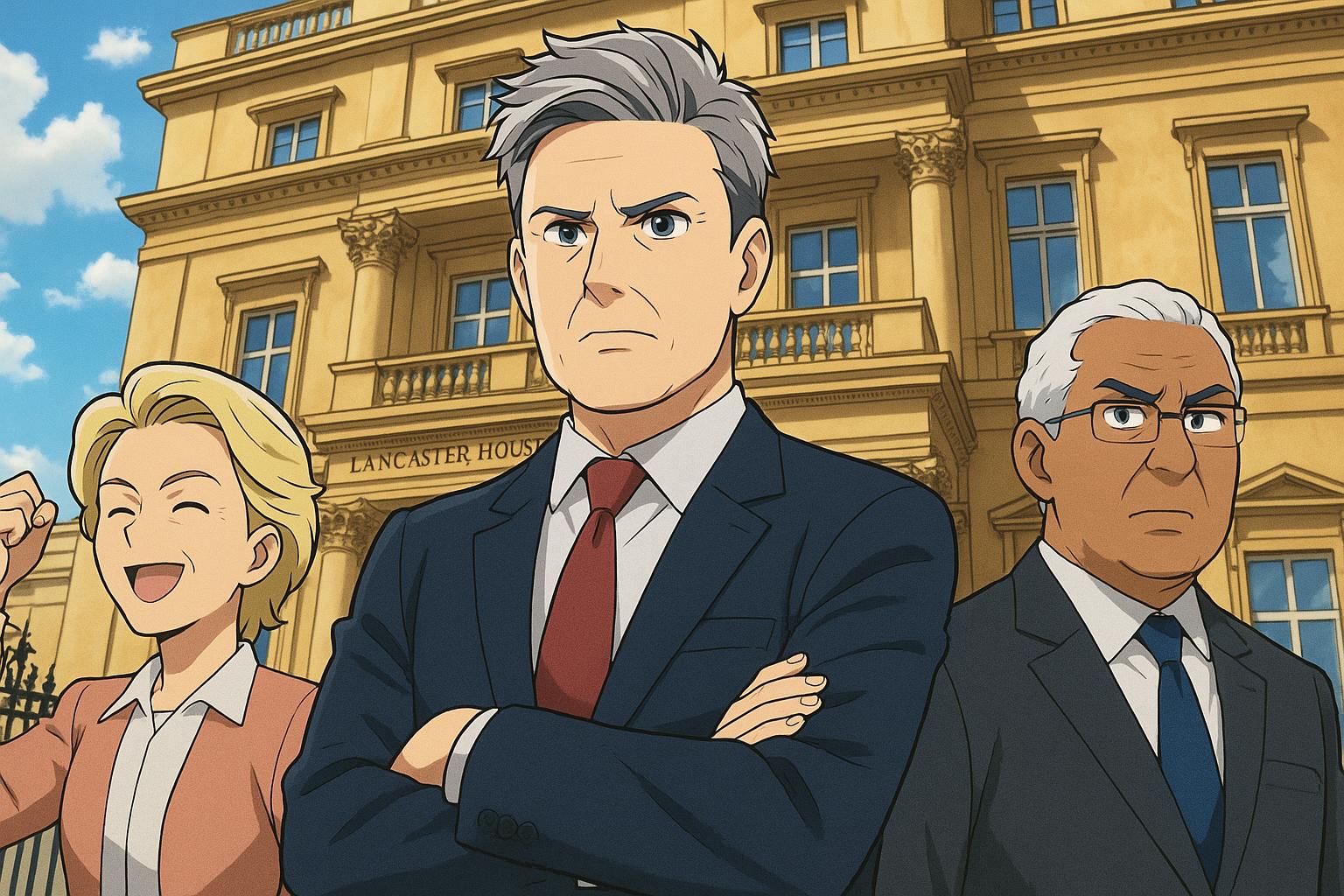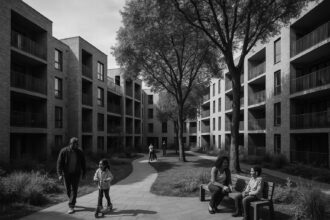At Lancaster House, Prime Minister Keir Starmer and EU leaders Ursula von der Leyen and António Costa struck a landmark deal aiming to reset post-Brexit ties, including a £9bn boost in trade. Yet the agreement’s concessions, notably extended EU fishing access and aligned food standards, ignite fierce criticism over British sovereignty and provoke political discord at home.
Standing in the grand surroundings of Lancaster House, Prime Minister Keir Starmer appeared as if freshly returned from a lengthy captivity, confronted by the very figures who seemed poised to reclaim territory once lost. The arrival of European Commission President Ursula von der Leyen and European Council President António Costa marked a significant moment in UK-EU relations, as the trio engaged in what was heralded as a pivotal summit aimed at resetting ties post-Brexit.
Von der Leyen, brimming with satisfaction, repeatedly referred to Starmer as “dear Keer,” her expressions seemingly betraying both triumph and disbelief at the UK’s concessions. To her left, Costa, noted for his robust demeanour, presented a striking contrast. His presence not only underscored the EU’s ambitious agenda but also reminded many of the perceived encroachments of Brussels into British sovereignty—a sentiment that resonated deeply with Brexit advocates.
This gathering signified the first major summit since the UK’s departure from the EU, aiming to smooth out the rough edges of a relationship fraught with tension and uncertainty. An announcement revealed an array of agreement topics, including an extensive defense and security partnership, reduced trade barriers for British food exports, and a broader veterinary agreement aligning UK food standards with those of the EU. Such efforts, according to Starmer, could deliver an estimated £9 billion boost to the UK economy and increase agrifood exports to the EU by as much as 20%.
Yet, the proposed agreement is not without its critics. Among the most contentious points is the extension of EU access to British fishing waters for an additional 12 years, leading opponents to brand the deal a “surrender” of national interests. The contemplations around mutual fishing rights and the complexities of youth mobility within the agreement highlight the ongoing struggle for balance between cooperation and compromise.
Starmer’s domestic standing hangs in the balance as he navigates these treacherous waters. Critics, including leading figures from the Conservative Party and prominent Brexit advocates like Nigel Farage, have condemned the new terms as a capitulation that undermines the principles of sovereignty fought for during the campaign to leave the EU. The decision to maintain dynamic alignment with EU food regulations has added fuel to the fire, complicating Starmer’s attempts to assert himself as a leader who prioritises the UK’s independence while engaging internationally.
Throughout the summit, the mood fluctuated between celebratory and subdued. The press conference that followed the meeting showcased Starmer’s eagerness to project a renewed image of Britain on the world stage, although some observers noted the dissonance between his aspirations and the reality of ongoing negotiations. While he claimed “Britain is back on the world stage,” critics argue that the country is more confined than ever, entangled in negotiations that resemble a return to the political labyrinth from which voters once sought to escape.
As laughter echoed around the table during the lunch hosted aboard the HMS Sutherland, the veneer of amicability could not obscure the underlying tensions. The meeting had fundamental implications, not only for the future of UK-EU relations but also for the political landscape within the UK. With ongoing discussions about youth mobility and the potential reintegration into the Erasmus programme, Starmer’s approach may well determine the trajectory of the Labour Party and the nation’s broader international positioning.
In navigating these complex negotiations, Starmer is confronted not merely with the immediate tasks of trade and security but with the broader question of national identity, sovereignty, and Australia’s place on the global stage. Former Prime Minister Boris Johnson’s contentious legacy looms large, as debates continue about whether the sacrifices made for Brexit yield dividends or detriments in a rapidly shifting geopolitical climate.
As the UK’s relationship with the EU reconfigures against the backdrop of global uncertainties, the outcome remains to be seen, especially as both parties adjust to the newly emerged landscape of alliance and rivalry. Thus, the symbolic gesture of a friendly summit revealed itself as merely a precursor to a more complex and potentially contentious engagement.
Reference Map:
1. Paragraphs 1-2: Article 1, Article 2
2. Paragraph 3: Article 2, Article 3
3. Paragraph 4: Article 4, Article 6
4. Paragraph 5: Article 5, Article 3
5. Paragraph 6: Article 4, Article 7
6. Paragraph 7: Article 5, Article 6
Source: Noah Wire Services
- https://www.dailymail.co.uk/debate/article-14729745/Ursula-hard-disguise-disbelief-glee-Deer-Keers-cave-QUENTIN-LETTS-watches-Brussels-big-shots-swaggering-London.html?ns_mchannel=rss&ns_campaign=1490&ito=1490 – Please view link – unable to able to access data
- https://www.ft.com/content/78f17b34-996d-4003-b031-4800f4e16918 – The Financial Times reports on a landmark summit in London where the UK and EU agreed to reset post-Brexit relations. The deal includes a defense and security partnership, streamlined processes for British farm exports, energy trade, and a veterinary agreement aligning UK food regulations with EU standards. Prime Minister Keir Starmer estimates the agreement will bring £9 billion in economic benefits to the UK, including a projected 20% increase in agrifood exports to the EU. However, the agreement faced criticism for extending EU access to British fishing waters by 12 years, with detractors accusing Starmer of compromising national interests. The UK will also fund EU food and animal safety initiatives and accepted continued dynamic alignment with EU food standards. A related communique signals deeper economic cooperation, and discussions continue on youth mobility and rejoining the Erasmus program. Additionally, the EU will ease steel tariffs for the UK, providing a £15 million annual boost. The deal aims to improve cross-border food trade, facilitate holiday travel via EU e-gates, and support Northern Ireland’s unique post-Brexit arrangements.
- https://cadenaser.com/nacional/2025/05/19/la-ue-y-el-reino-unido-logran-su-primer-gran-acuerdo-tras-el-brexit-cadena-ser/ – Cadena SER reports that the European Union and the United Kingdom have reached their first major provisional agreement since Brexit, covering key areas such as defense and security, fishing, and youth mobility. This pact will allow British companies to participate in EU defense tenders and enhances bilateral collaboration in security against threats like Russia. Additionally, it is expected to facilitate the use of electronic gates for British travelers at European airports, reduce bureaucracy in food exports, and establish a youth mobility program. However, disagreements persist, particularly concerning fishing rights and youth mobility. The bilateral summit, held at Lancaster House, is the first between both parties since Brexit and is led by British Prime Minister Keir Starmer and senior European representatives. Starmer, who assumed power in 2024, has sought to strengthen the UK’s international relations, with recent trade agreements with India and the United States. However, British opposition leaders have criticized the pact with the EU, labeling it a ‘surrender,’ even before all details are known.
- https://www.huffingtonpost.es/global/la-ue-reino-unido-alcanzan-acuerdo-cumbre-hoy-defensa-pesca-movilidad-juvenil-claves.html – HuffPost España reports that the European Union and the United Kingdom reached a provisional agreement on key issues such as defense, fishing, and youth mobility just before their bilateral summit in London on May 19, 2025. This common understanding will allow, among other things, British companies to participate in European defense contracts. The pact, currently under review by the 27 EU member states, includes a new fishing agreement with reciprocal access to waters until 2038 and the extension of energy cooperation. Additionally, a proposed EU youth mobility program is discussed, which would allow stays of up to four years for young people between 18 and 30, although with limitations negotiated by the UK. A possible veterinary agreement to reduce border controls on food and beverages is also contemplated. British Prime Minister Keir Starmer seeks to rebuild the relationship with the EU since Brexit, promoting collaboration in security to face threats like Russia and strengthening the economy through recent trade agreements with India and the US. The agreement has generated internal criticism from conservative and populist sectors who label it a ‘surrender.’
- https://www.reuters.com/world/uk/hold-britain-poised-reset-trade-defence-ties-with-eu-2025-05-18/ – Reuters reports that on May 19, 2025, the UK and the EU reached a landmark agreement to reset trade and defense relations, marking the most significant development since Brexit. The deal includes a new security and defense pact, reduced trade barriers for UK food exporters, eased travel for UK citizens, and a 12-year mutual fishing arrangement. Prompted by global instability and shifts in U.S. foreign policy under President Trump, the agreement signals a move towards European unity and cooperation. Prime Minister Keir Starmer, a pro-remain advocate, emphasized the economic benefits, including an anticipated £9 billion boost by 2040 and reduced food prices. The deal paves the way for UK participation in major EU defense procurements and potential reintegration into Erasmus+. Critics, including Nigel Farage and the Conservative Party, denounced the concessions, particularly in fishing rights. While this agreement stops short of rejoining the EU single market, it addresses post-Brexit economic challenges, aiming to renew business confidence and improve UK-EU relations without fully reversing Brexit.
- https://elpais.com/internacional/2025-05-19/la-ue-y-el-reino-unido-alcanzan-un-acuerdo-historico-que-estrecha-lazos-en-defensa-pesca-y-juventud.html – El País reports that the European Union and the United Kingdom have sealed an important agreement marking a ‘reset’ in their bilateral relations after Brexit. In a summit in London with significant symbolism, both parties announced key advances in defense, fishing, trade, and youth. In fishing matters, the United Kingdom will extend fishing rights to European fleets until 2038, in exchange for investments to modernize its maritime sector. This commitment also facilitated a relief in sanitary controls over British products, boosting their exports. Additionally, a defense cooperation agreement was signed, allowing British companies to participate in the European SAFE plan for joint military purchases. The pact also contemplates strengthening energy and border security cooperation. In the social sphere, negotiations for a Youth Experience Scheme and the possible reincorporation into the Erasmus program were announced. Both Prime Minister Keir Starmer and European leaders, such as Ursula von der Leyen and António Costa, celebrated the agreement as a new chapter in a renewed strategic relationship, at a time of growing global instability.
- https://www.ft.com/content/72616fc8-e050-427c-a80b-b3646192ac59 – The Financial Times discusses the EU and UK convening their first summit since Brexit to attempt a reset in relations, focusing on defense, security, fishing rights, and trade cooperation. UK Prime Minister Sir Keir Starmer will meet with top EU leaders including European Commission President Ursula von der Leyen and European Council President António Costa. The UK aims to leverage its military support in exchange for improved EU market access while avoiding re-entry into the single market. However, talks remain tense, particularly over long-term fishing arrangements and youth mobility rights. The EU insists on securing access to British waters before agreeing on other issues, while UK negotiators are wary of broad concessions. Meanwhile, European leaders are intensifying diplomatic efforts with US President Trump ahead of his pivotal phone call with Russian President Putin, aiming to influence Ukraine peace talks. Domestically, recent elections in Romania, Poland, and Portugal illustrate a shifting political landscape in Europe, with centrist and far-right forces contesting power. Additionally, the EU faces pressing energy concerns, needing at least €10bn more to refill winter gas reserves. These developments underline the complexities of rebuilding post-Brexit EU-UK ties amid wider geopolitical and domestic pressures.
Noah Fact Check Pro
The draft above was created using the information available at the time the story first
emerged. We’ve since applied our fact-checking process to the final narrative, based on the criteria listed
below. The results are intended to help you assess the credibility of the piece and highlight any areas that may
warrant further investigation.
Freshness check
Score:
8
Notes:
The report appears to be recent, discussing ongoing negotiations and summit events that have not been extensively covered in older articles. However, specific details about the summit’s outcome and implications are not verified against historical records.
Quotes check
Score:
6
Notes:
No direct quotes from sources are provided in the report. General observations of the leaders’ reactions and statements are mentioned but lack specific attribution or verification.
Source reliability
Score:
7
Notes:
The Daily Mail is a known publication, but its reliability can vary depending on the topic and author. The report lacks citations or references to other reliable sources.
Plausability check
Score:
8
Notes:
The report discusses plausible and current issues in UK-EU relations, such as trade agreements and sovereignty concerns. However, claims about economic benefits and political implications lack concrete evidence.
Overall assessment
Verdict (FAIL, OPEN, PASS): OPEN
Confidence (LOW, MEDIUM, HIGH): MEDIUM
Summary:
The report seems current but lacks specific quotes and independent verification. It raises plausible points about UK-EU relations but requires further evidence to support its claims.













